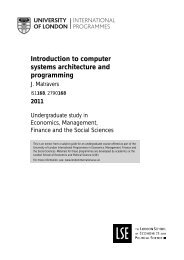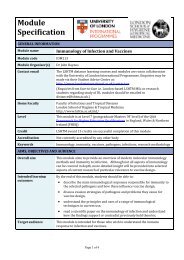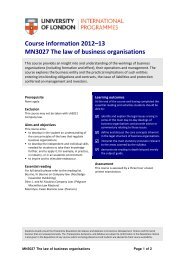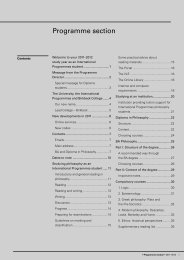Principles of sociology - University of London International ...
Principles of sociology - University of London International ...
Principles of sociology - University of London International ...
You also want an ePaper? Increase the reach of your titles
YUMPU automatically turns print PDFs into web optimized ePapers that Google loves.
21 <strong>Principles</strong> <strong>of</strong> <strong>sociology</strong><br />
14<br />
Bauman, Z. Thinking sociologically. (Oxford: Blackwell, 1990).<br />
Berger, P. Invitation to <strong>sociology</strong>. (Harmondsworth: Penguin, 1963).<br />
Mills, C. Wright The sociological imagination. (Harmondsworth: Penguin, 1970).<br />
Websites<br />
www.sociolog.com<br />
This website gives links to a range <strong>of</strong> other <strong>sociology</strong> resources.<br />
www.<strong>sociology</strong>.org.uk<br />
This is a British <strong>sociology</strong> website, geared towards the British school<br />
syllabuses but it has a lot <strong>of</strong> good introductory material and useful links to<br />
specialist <strong>sociology</strong> websites.<br />
Video/DVD<br />
Introducing Sociology (halo vine, 2004) [www.halovine.com].<br />
A short video/DVD giving some insights into ‘sociological thinking’ by<br />
explaining what <strong>sociology</strong> is about and showing how a sociologist might<br />
bring a very different perspective to everyday things like the mobile (or<br />
hand) phone and the security camera.<br />
Works cited<br />
Bowles, S. and H. Gintis Schooling in capitalist America. (<strong>London</strong>: Routledge,<br />
1976) [ISBN 9780465097180 (pbk)].<br />
G<strong>of</strong>fman, E. The presentation <strong>of</strong> the self in everyday life. (Harmondsworth:<br />
Penguin, 1971) [ISBN 9780140213508 (pbk)].<br />
Mead, G. Mind, self and society. (<strong>University</strong> <strong>of</strong> Chicago, 1934).<br />
Parsons, T. The social system. (New York: Free Press, 1951).<br />
Willis, P. Learning to labour. (Aldershot: Ashgate, 1993) [ISBN<br />
9781857421705].<br />
1.1 Introduction<br />
We are living in a world <strong>of</strong> dramatic and unprecedented social change:<br />
new technologies and cultural upheavals are transforming our lives. As<br />
prosperity grows and cultural taboos break down, millions <strong>of</strong> people in<br />
modern industrialised societies are confronted by more choices than ever<br />
about how to live their lives. However, it seems that the drive for ever<br />
greater prosperity and new-found freedoms and lifestyle choices come at<br />
a price, as rates <strong>of</strong> crime, mental disorder, drug addiction and self harm<br />
continue to rise.<br />
So how did the world become this way? Why are people’s lives today<br />
so different from those <strong>of</strong> their parents and grandparents? What are<br />
the possibilities for our lives in the future? These are the questions that<br />
<strong>sociology</strong> asks and attempts to answer. Sociology is about trying to<br />
understand the social world, but it is also about trying to understand<br />
ourselves, and how societies make us who we are.<br />
This chapter is designed to help you start thinking like a sociologist. It is<br />
not about learning theories or facts and figures. It is about understanding<br />
what it means to ‘think sociologically’. It is simple and, we hope, you<br />
should find it quite easy to follow. Once you start thinking sociologically<br />
you will find the later chapters on research and theory and the topic areas<br />
covered later in this chapter and in Sections B and C easier to understand.
















